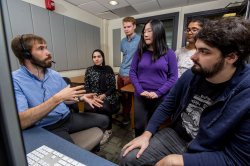Language Lovers Find Connections with STEM, Humanities
Posted in: Homepage News and Events, Linguistics

As a jazz and blues singer, Rebecca Stachowicz is used to performing in rooms with good acoustics. Recently, she’s been broadening her repertoire, performing research as a graduate assistant in the old University radio station, studio space repurposed for the study of language and its connections with the humanities, science and technology.
On a recent visit to the Experimental Linguistics Lab, Stachowicz sported an elastic cap fitted with electrodes. It’s a tool in the research of Lauren Covey, an assistant professor who studies how the brain processes complex sentences in order to better understand the differences and similarities between native speakers of a language and adult second language learners.
Since WMCS’s move to new digs, students and faculty are making use of the sound paneling in the former radio studio and control rooms to record and analyze language. “The kind of data we are working on involves acoustic and electrical waveforms, and statistical visualizations,” says Jonathan Howell, associate professor of Linguistics.
The projects include a study on the language variety linguists term African-American English and work annotating speech to detect differences in rhythm, stress and intonation. It’s a sampling of the linguistics research taking place at Montclair State University, much of it supported by grants from the National Science Foundation.
With the opening of the new Center for Computing and Information Science, the University has added a new Master of Science in Computational Linguistics, the only program of its kind in New Jersey to provide the interdisciplinary training in computer science and linguistics to help machines process human language and to help linguists understand language through computer models.
“Computational linguistics is not a brand-new field, but these days it’s developing rapidly,” says Anna Feldman, professor of Linguistics and Computer Science. “For those who like languages, computers and math, it is probably the best time to be alive.”
Melaney Moffitt ’19 will be among the first cohort in the Computational Linguistics master’s program. Since graduating this spring with a bachelor’s in Linguistics, she is working for a company that provides artificial intelligence to field customer-service calls. She is also continuing research annotating speakers of African-American English to help technology improve – and to find the gaps – in interpreting dialects, she explains.
Computational Linguistics collaborates across campus, Feldman says. Inside the University’s Natural Language Processing (NLP) lab, her work includes automatic detection of figurative language and the linguistic fingerprints of political censorship. Eileen Fitzpatrick, the department’s chairperson, is a computational linguist working on deception detection.
Montclair State students play a large role in contributing to the body of work, including assisting with research on automatic detection of suicidal tendencies and detection of depression. Kei Yin Ng, who graduated this spring with the MA in Applied Linguistics, continues research on internet censorship. “Studying internet censorship is not a trivial task. It requires a lot of careful data manipulation to draw insights from a large amount of data,” she says. “My research advisors offered great support and guidance during the process.”
In the former radio station, Howell is leading a team of undergraduate and graduate students examining acoustic and electrical waveforms, and statistical visualizations. The students include Zachary Zerby ’16, a graduate assistant working toward a master’s degree in Applied Linguistics. He’s helping develop the algorithms for speech technology – things like Siri, Google Assistant and Dragon speech recognition – to better understand nuanced language.
As varied as the research, the students contributing to the work come to the study of linguistics from many different paths, including pre-med, speech pathology and music.
Since graduating from a music conservatory, Stachowicz has supplemented her singing career by teaching English lessons to non-native speakers. She enrolled in The Graduate School at Montclair State to research “music as a teaching tool and as a therapy tool in a language modality.”
This summer she is the research assistant for Covey’s experimental study using electroencephalography (EEG) to examine how individual differences in memory and other cognitive skills influence second language comprehension – specifically looking at brain activity for patterns on how native English speakers and Chinese-speaking learners of English comprehend complex sentences in real time.
“Linguistics brings together science and humanities in a really unique way,” Covey says.
Learn more about Montclair State’s new master’s program in Computational Linguistics
